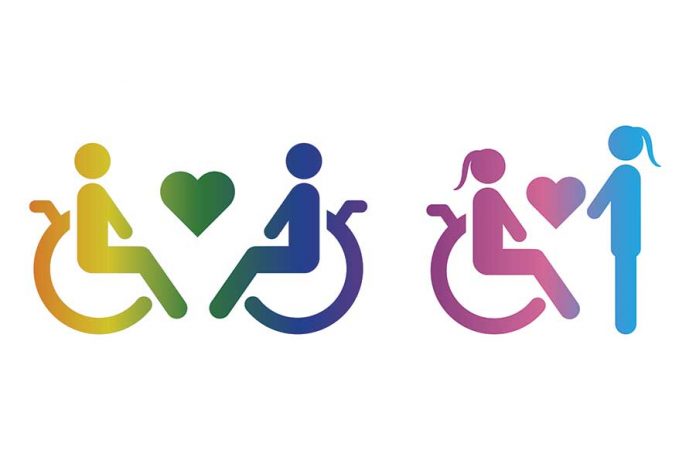“Everybody is a sexual a being,” Vicki Landers, president and CEO of Disability Pride Philadelphia (DPP), said. “People with disabilities have sex too.”
But talking about sex — or even acknowledging that folks with disabilities are also sexual — has long been a taboo topic, and people with disabilities are frequently left out of the social discourse on sex and sexuality.
Having the conversation is the first step, said Landers. DPP — a nonprofit committed to promoting disability pride, teaching accessibility and thriving for inclusion through fun, accessible, inclusive events — is hosting an event on Valentine’s Day, “Let’s Talk About Disabled Sex,” to provide inclusive sex education for people with physical and intellectual disabilities.
“We cover the circle of sexuality, safer sex, today’s terminology of sexual orientation and gender identity,” Landers said, adding that in “everything DPP does, we try to be inclusive.”
She said it’s essential to address the “intersection of disabilities and LGBTQIA communities” because “many members of the LGBTQIA community identify as disabled — crossover is very important.”
Maisha Elonai is a volunteer with DPP and the executive assistant at Liberty Resources Inc., a nonprofit organization that promotes independent living for people with disabilities.
Elonai, who identifies as queer, said the reasons for such an event are myriad.
“The community we work with doesn’t have much exposure to the LGBTQ community,” she said, noting how crucial it is that queer and trans people with disabilities feel welcomed and encouraged to talk about their sexuality and navigate what non-disabled people often take for granted in relationships.
Both Landers and Elonai emphasized how the issue of consent is critical for disabled people. According to uniform crime statistics, 83 percent of women with disabilities will be sexually assaulted in their lives, as will 30 percent of disabled men. People with intellectual disabilities are often most at risk, and only 3 percent of such sexual assaults get reported.
Elonai said folks with disabilities are often in the complicated position of having caregivers who are attending to intimate needs like bathing and getting dressed, and it’s crucial folks living with disabilities know that “those people are only there to enable us and help us.”
“They are not there to control us,” Elonai said, “and if they do something, like approach us in a non-consensual manner, we have the right to say ‘no,’ and we have the right to report them.”
Landers said the DPP event will address a range of sexual questions, including how to “come out” as disabled to a prospective sexual partner, particularly for people with invisible disabilities. Another issue is how to discuss disability and sexual ability. “Communication is key,” Elonai said. “A lot of people aren’t sure how to broach the subject when a relationship reaches the point where people are getting ready to have sex.”
Adaptive sex toys for people with disabilities will also be discussed. Landers said she worked with Kelly Morgan of Sexploratorium at 2nd and South Sts. “She has a wealth of information about things that can help people enjoy themselves and others.”
Elonai said broadening the discourse on sexuality to both include people with disabilities and enlighten the LGBTQ community about disability generally is something she wants to see on a larger scale. “We need to be aware of and sensitive to disability and sexuality and where that intersects,” she explained.
She said “adjacent advocacy” is key and noted that LGBTQ people with disabilities have to navigate a lack of inclusivity in the LGBTQ community while also addressing their sexual orientation and/or gender identity in the disability community. “There are so many areas of overlap,” Elonai said. “We want to make sure that people understand basic language in a way that helps folks understand mutual and disparate areas of concern — that goes together with disability pride.”
Landers said people with disabilities are often not included in sex education classes in school because they are viewed as being non-sexual and incapable of romantic and sexual relationships — which makes the DPP event even more important. She said DPP will be taking a survey about what events people want to have and will be holding other mini-seminars on sex in the future.
Elonai said, “We should all be aware of the fact that love is love, pleasure is pleasure. We’re all coming as we are to it, and we can all learn from each other. We have to stick together.”
“Let’s Talk About Disabled Sex” is on Feb. 14 from 10:00 a.m. to 4:00 p.m. in the Wade Blank Conference Room at Liberty Resources, Inc., at 112 N. 8th St.
